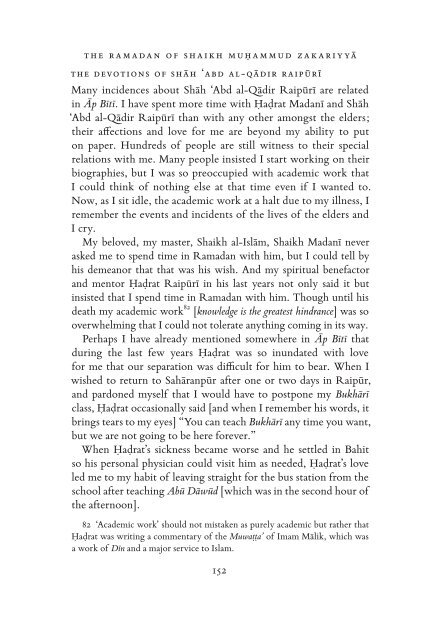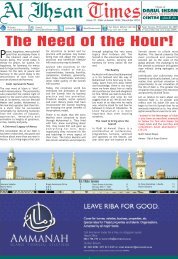TheRamadan of Shaykh Al-Hadith Ml ZakariyyaKandelwi by Dr Muhammad Ismail Memon Madani
TheRamadan of Shaykh Al-Hadith Ml ZakariyyaKandelwi by Dr Muhammad Ismail Memon Madani
TheRamadan of Shaykh Al-Hadith Ml ZakariyyaKandelwi by Dr Muhammad Ismail Memon Madani
Create successful ePaper yourself
Turn your PDF publications into a flip-book with our unique Google optimized e-Paper software.
the ramadan <strong>of</strong> shaikh muĤ ammud zakariyyĀ<br />
The devotions <strong>of</strong> Shāh ‘Abd al-Qādir Raipūrī<br />
Many incidences about Shāh ‘Abd al-Qādir Raipūrī are related<br />
in Āp Bītī. I have spent more time with Ĥađrat Madanī and Shāh<br />
‘Abd al-Qādir Raipūrī than with any other amongst the elders;<br />
their affections and love for me are beyond my ability to put<br />
on paper. Hundreds <strong>of</strong> people are still witness to their special<br />
relations with me. Many people insisted I start working on their<br />
biographies, but I was so preoccupied with academic work that<br />
I could think <strong>of</strong> nothing else at that time even if I wanted to.<br />
Now, as I sit idle, the academic work at a halt due to my illness, I<br />
remember the events and incidents <strong>of</strong> the lives <strong>of</strong> the elders and<br />
I cry.<br />
My beloved, my master, Shaikh al-Islām, Shaikh Madanī never<br />
asked me to spend time in Ramadan with him, but I could tell <strong>by</strong><br />
his demeanor that that was his wish. And my spiritual benefactor<br />
and mentor Ĥađrat Raipūrī in his last years not only said it but<br />
insisted that I spend time in Ramadan with him. Though until his<br />
death my academic work 82 [knowledge is the greatest hindrance] was so<br />
overwhelming that I could not tolerate anything coming in its way.<br />
Perhaps I have already mentioned somewhere in Āp Bītī that<br />
during the last few years Ĥađrat was so inundated with love<br />
for me that our separation was difficult for him to bear. When I<br />
wished to return to Sahāranpūr after one or two days in Raipūr,<br />
and pardoned myself that I would have to postpone my Bukhārī<br />
class, Ĥađrat occasionally said [and when I remember his words, it<br />
brings tears to my eyes] “You can teach Bukhārī any time you want,<br />
but we are not going to be here forever.”<br />
When Ĥađrat’s sickness became worse and he settled in Bahit<br />
so his personal physician could visit him as needed, Ĥađrat’s love<br />
led me to my habit <strong>of</strong> leaving straight for the bus station from the<br />
school after teaching Abū Dāwūd [which was in the second hour <strong>of</strong><br />
the afternoon].<br />
82 ‘Academic work’ should not mistaken as purely academic but rather that<br />
Ĥađrat was writing a commentary <strong>of</strong> the Muwaţţa’ <strong>of</strong> Imam Mālik, which was<br />
a work <strong>of</strong> Dīn and a major service to Islam.<br />
152



